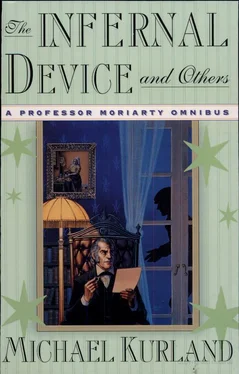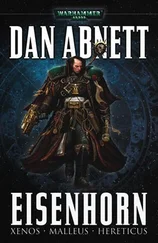"And may I speak with him?"
"May I inquire as to the nature of your business, sir?"
"My name is Sherlock Holmes, Sergeant," Holmes said. He waited a second for a reaction, and when he got none, he continued, "I have some information which will be of interest to Inspector Peebles."
"Yes, sir. Might I inquire as to the nature of that information?"
Holmes sighed. "I really don't want to go through it twice," he said. "Time is limited. It concerns a plot against the life of Her Majesty the Queen!"
"Yes, sir," the sergeant said. "Another plot against the life of the Queen. Very good of you to come in and warn us about it. I can assure you, sir, that proper precautions are being taken."
Holmes rapped his stick against the desk. "This is not a joke, Sergeant!" he said. "I insist upon speaking to the inspector."
The sergeant sighed. "Yes, sir," he said. "If you will excuse me for a second sir, I'll tell him he's wanted." The sergeant left his desk and disappeared into the back.
Holmes looked over to Moriarty and saw that he was silently laughing. "This is not amusing!" he rasped.
"No," Moriarty agreed. "Of course it isn't."
Inspector Peebles, a plump, smiling man, entered the room with the sergeant. "Now, now," he said, chuckling happily, "what's all this?"
"My name is Sherlock Holmes, Inspector," Holmes said, "and I have information regarding an attempt that is going to be made against the life of Queen Victoria."
"Now, that's very serious," the inspector said, still smiling. "Just how is this attempt going to be made?"
"By submersible boat."
"By what, sir? What was that?" A puzzled look replaced the smile.
"By submersible boat. Submarine. We have reason to believe that a foreign agent has smuggled a submersible boat into the harbor and is planning to blow up the Victoria and Albert."
"Now, now, that's quite serious, sir," the inspector said ponderously. "Just where is this submersible located now, sir?"
"I don't know," Holmes said.
"I see, sir," the inspector said. He turned to Moriarty. "Is this gentleman with you?"
"That's right, Inspector," Moriarty admitted.
"Well, why don't you and your friend just go out and find this submersible for us. As soon as you have found it, you be sure to come back here and tell us where it is." The inspector's smile returned. "Then we'll take care of it for you."
"Yes, Inspector, we'll certainly do that. Thank you, Inspector. Come along now, Holmes."
-
They left the station together, Moriarty silent and Holmes fuming. "They didn't believe me," he said, the line of his jaw rigid with fury. "They treated me as though I were mad!"
"Well, it is a rather incredible story," Moriarty said. "I'm sure that if Lestrade were here you could convince him, however. You seem to be able to convince him of anything."
"We've got to find that boat by ourselves," Holmes said.
"Yes," Moriarty agreed. "And I think we'd best be about it."
They proceeded north along the waterfront, poking into and exploring every wharf and jetty they passed. Gradually, Holmes regained his good humor as he became intrigued with the problems of the search. Moriarty stopped in fascination at a clearing by the Naval Barracks where two great balloons were slowly puffing up on the ground. They were being filled with hydrogen gas, generated by a complex self-contained apparatus resting in two wagons by the side of the field. Canvas pipes, treated with gutta-percha, connected the generator with the balloons.
"What's happening here?" Moriarty demanded of a frock-coated man who was directing the operation.
The man turned to him and took off his stiff top hat. "Balloons, sir," he said. "Observation balloons."
"I can see that," Moriarty said. "I have some small knowledge of aerostatics myself. My name is Professor James Moriarty and this is Mr. Sherlock Holmes."
"I am Hyman Miro," the man announced. "Scientist and inventor and developer of the Miro-graphy system of wet-plate photography."
"Ah, yes," Moriarty said. "I am somewhat familiar with the system. It employs a reversal process using a collodion plate and the bromide of silver. The developer, if I remember correctly, is largely pyrogallic acid."
Miro beamed. "That is correct, sir. Pyrogallic acid and ammonium carbonate, with potassium bromide. You have employed my system?"
"Yes, sir," Moriarty said. "The photography of celestial bodies requires rapid, fine emulsions. Yours is quite adequate."
"We, ah, have business, Moriarty," Holmes said, tapping his foot.
"Patience, Holmes," Moriarty said. "Meeting Mr. Miro may prove very useful. You are," he asked Miro, "planning to use these balloons as tethered observation platforms for the purposes of photography?"
"I am," Miro said. "If the weather remains fine, I should be able to expose my plates for no more than the tenth part of a second and still get a complete image. I will be able to stop the motion of the ships on the water, sir. A wonderful thing."
"And you are going to be up in them all day?"
"Up and down, sir. Up and down. The wet plates must be developed within minutes of being exposed or they lose detail. The darkroom will be erected between the two balloons, which will be lowered and raised on command by a powerful winch."
"Very clever, sir," Moriarty said.
"Until six o'clock, sir," Miro said.
"Ah?" Moriarty said.
"Yes. The P.L.R.F.C. is taking over the balloons at six to prepare for their fireworks display. Can you imagine, sir, fireworks from a hydrogen balloon? It's the height of idiocy!"
"The P.L…" Holmes said.
"Yes, sir. The P.L.R.F.C. The Portsmouth Library and Recreation Fund Committee. They are in charge of the evening's festivities. Fireworks!"
"Really, Moriarty," Holmes said.
Moriarty raised his hand. "Mr. Miro," he said. "I am about to entrust you with a grave responsibility."
"Sir?" Miro said.
"We have reason to believe that an attempt is going to be made to blow up the Victoria and Albert."
" The Royal Yacht?"
"Correct. A madman who has stolen, and has in his possession, a submersible craft, is going to use it to approach and destroy the Royal Yacht, with Her Majesty on board. We are trying to apprehend him now, but if we fail, then in a matter of hours he will carry out his plan."
"Well, sir," Miro said, "what can I do about it?"
"A submerged craft is much more readily visible from high above than from the side. It is a matter of the angle subtended. The craft has to be within a hundred yards of the Royal Yacht to release its Whitehead torpedo. You'll have a fine view."
Miro's eyes lit up. "What a photograph!" he said. "But you can't mean that you want me to spend the day searching for this undersea craft? I wouldn't be able to get any photographs."
"No, sir," Moriarty said. "What I'd like is to send my assistant up with you. Not this gentleman," Moriarty said quickly, as Miro eyed Holmes, "but another."
"What good will that do?" Miro asked. "We'll be up there, and you'll be down here."
"You said something about fireworks," Moriarty said. "My assistant could take some up with him, and let off a colored rocket if he spots the craft."
Miro thought for a minute. "Sounds crazy to me," he said. "But… you say you've used my process for astronomical photography?"
"I'll be delighted to show you my plates," Moriarty said.
Miro clapped his topper back on his head. "Send your man over," he said. "It doesn't matter when: I'll be up and down all day."
"Thank you, sir," Moriarty said. "You're doing a great service for your country — and your queen."
"I'll be in touch with you," Miro said, "about viewing those plates."
Holmes and Moriarty continued their northward quest, examining the Filling Basin and the Rigging Basin of the big naval shipyard, and on to Fountain Lake, the tidepool where the frigates were moored. Whale Island, with its great Gunnery School, thrust out into the commercial harbor beyond. They walked slowly around each pier and mooring, looking for a place where a forty-foot-long submersible could be hidden. There was no such place.
Читать дальше












